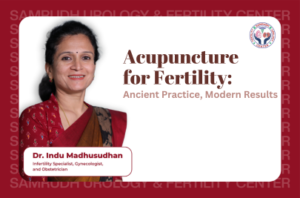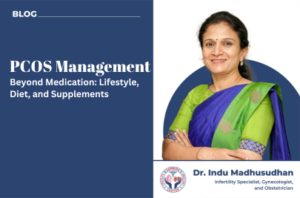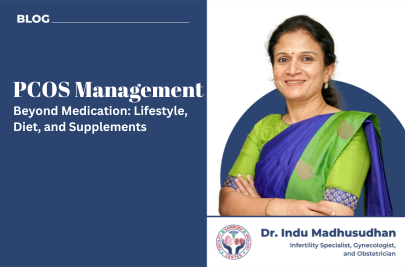Introduction
Polycystic Ovary Syndrome (PCOS) is a prevalent hormonal disorder affecting women of reproductive age. While medications like metformin and hormonal contraceptives are commonly prescribed, integrating lifestyle modifications, dietary changes, and specific supplements can offer a comprehensive approach to managing PCOS symptoms. At Samrudh Fertility and Urology Centre in Kumaraswamy Layout, Bangalore, Dr. Indu Madhusudan emphasizes a holistic strategy tailored to individual needs.
Understanding PCOS
PCOS is characterized by hormonal imbalances, insulin resistance, and metabolic challenges. Symptoms often include irregular menstrual cycles, ovarian cysts, acne, weight gain, and infertility. Addressing these symptoms requires a multifaceted approach that goes beyond conventional medication.
Lifestyle Modifications
- Regular Physical Activity
Engaging in consistent exercise, such as brisk walking, swimming, or strength training, can improve insulin sensitivity and aid in weight management. Even a modest weight loss of 5-10% can significantly alleviate PCOS symptoms.
- Stress Management
Chronic stress can exacerbate hormonal imbalances. Incorporating stress-reducing practices like yoga, meditation, or deep-breathing exercises can help regulate cortisol levels and improve overall well-being.
- Sleep Hygiene
Ensuring 7-9 hours of quality sleep per night supports hormonal balance and metabolic health. Establishing a regular sleep schedule and creating a restful environment are crucial steps.
Dietary Adjustments
- Emphasize Low-Glycemic Index (GI) Foods
Consuming low-GI foods helps stabilize blood sugar levels. Incorporate whole grains, legumes, nuts, seeds, and non-starchy vegetables into your meals.
- Increase Fiber Intake
High-fiber foods aid in digestion and can help manage insulin levels. Include foods like lentils, broccoli, Brussels sprouts, and avocados in your diet.
- Opt for Lean Proteins and Healthy Fats
Lean proteins (e.g., chicken, tofu) and healthy fats (e.g., olive oil, avocados) support satiety and hormonal balance. Avoid trans fats and limit saturated fat intake.
- Limit Processed Foods and Sugars
Reducing consumption of processed foods and added sugars can decrease inflammation and improve insulin sensitivity.
Beneficial Supplements
- Inositol
Inositol, particularly myo-inositol and D-chiro-inositol, has shown promise in improving insulin sensitivity and ovulatory function in women with PCOS.
- Vitamin D
Vitamin D deficiency is common in women with PCOS. Supplementation may improve menstrual regularity and insulin resistance.
- Omega-3 Fatty Acids
Omega-3 supplements can reduce inflammation and may help regulate menstrual cycles.
- Magnesium and Zinc
These minerals play roles in insulin metabolism and hormonal balance. Adequate intake may alleviate some PCOS symptoms.
- Berberine
Berberine, a plant compound, may improve insulin sensitivity and lipid profiles in women with PCOS.
Note: Always consult with a healthcare provider before starting any new supplement regimen.
Samrudh Fertility and Urology Centre’s Approach
Dr. Indu Madhusudan and her team at Samrudh Fertility and Urology Centre adopt a personalized approach to PCOS management. By integrating lifestyle counseling, dietary guidance, and appropriate supplementation, they aim to address the root causes of PCOS and improve patients’ quality of life.
Conclusion
Managing PCOS effectively requires a comprehensive strategy that extends beyond medication. Through lifestyle modifications, dietary changes, and targeted supplementation, women can take proactive steps toward hormonal balance and improved reproductive health. Under the expert guidance of Dr. Indu Madhusudan at Samrudh Fertility and Urology Centre, patients receive individualized care tailored to their unique needs.












